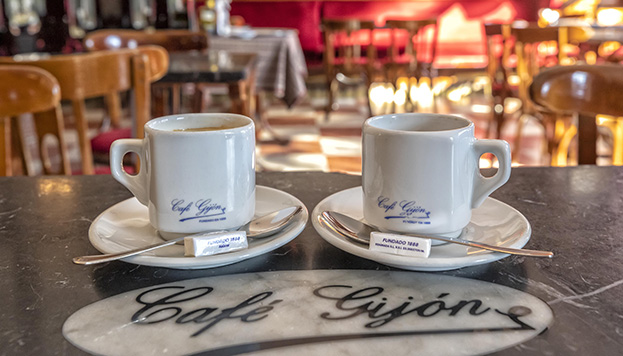
Café Gijón. © Álvaro López del Cerro
A large part of Madrid’s history has been witnessed by the marble tabletops of its coffee shops which, since the start of the 19th century, have enriched cultural life in the capital by hosting regular philosophical debates. Many others have followed suit, and it’s time to pay them a visit.

Café Manuela. ©Álvaro López del Cerro
“I go out for a coffee, and I sit on the sofas, and I bask in the dim glow of gas lamps,” said Ramón Gómez de la Serna, writer and journalist of the Spanish avant-garde movement. He was also the founder of the tertulia, a type of open philosophical debates that, back in the day, were held at Café del Pombo, one of the many establishments that rose to fame in Madrid at the start of the 19th century. These cafés were successors of the former botillerías – small businesses that sold drinks and ice creams and were initially conceived as places of transit but quickly become meeting points for the exchange of conversations. Soon coffee shops with tables and chairs where patrons could sit and talk more comfortably began to pop up, many of which mimicked the style of palatial drawing rooms and were lit with newly installed gas lamps. El Pombo could be found close to Puerta del Sol. But there were others, such as Café de Levante, Café del Príncipe, Café del Suizo, and Café de Fornos, all of which shared a passion for coffee and literature. Today you’ll find only two still standing; however, there are many more that have opened their doors in the spirit of their predecessors. And that’s where we’re headed!
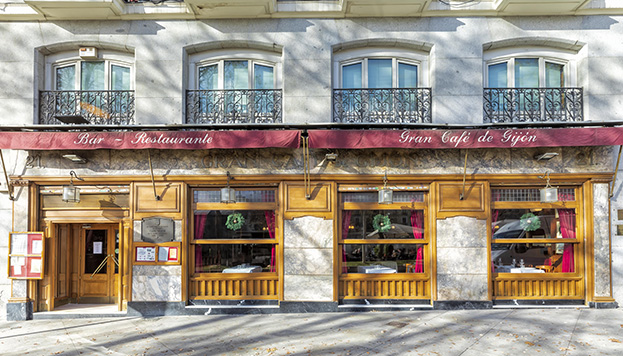
© Álvaro López del Cerro
With its brown marble façade, wooden finishes and three large windows, this coffeehouse is one of the capital’s greatest icons and a lasting reminder of former times in which places just like this would see writers and intellectuals get together to put the world to rights. Café Gijón opened its doors on 15 May 1888 thanks to the perseverance of Mr Gumersindo García who nostalgically baptised his new business with the name of the city where he was born.
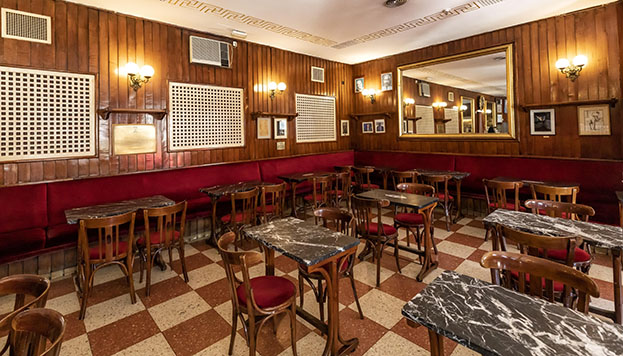
© Álvaro López del Cerro
Today this historical location is still home to its original black marble tables and some decorative elements from the days of its philosophical debates, such as its burgundy and ivory-tiled floor. Customers would head to Gijón after the theatre to discuss politics, bullfighting or any other current event. Benito Pérez Galdós, Santiago Ramón y Cajal, and Ramón María del Valle-Inclán, who loved the terrace area, were just some of the café’s regulars. Not forgetting Federico García Lorca, Salvador Dalí and Luis Buñuel, and groundbreaking women like Maruja Mallo, María Blanchar, and Celia Gámez.
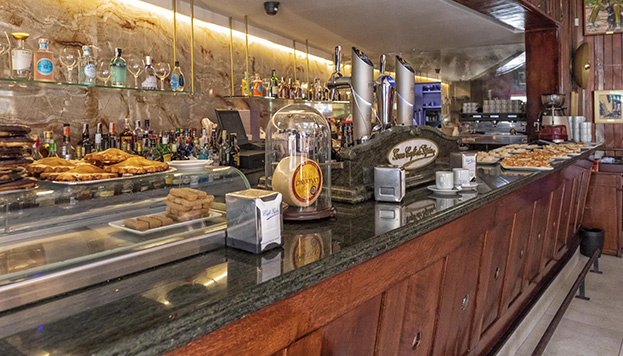
© Álvaro López del Cerro
Gijón was where people would go in search of inspiration, and it was also frequented by the likes of Gerardo Diego, Camilo José Cela and Francisco Umbral. Another regular was actor, director and writer Fernando Fernán Gómez, who founded a literary prize named after the café itself. The coffee shop is still open for business today, and still retains vestiges of its past despite undergoing renovation on various occasions. In 1949, the architect Carlos Arniches Moló, son of sainete opera writer Carlos Arniches, substituted the gas lamps for electric lighting and installed oak wood panelling on the walls. He wanted to add a touch of modernity to keep up with newer coffee shops that were opening in the city, none of which have taken Gijón’s place.
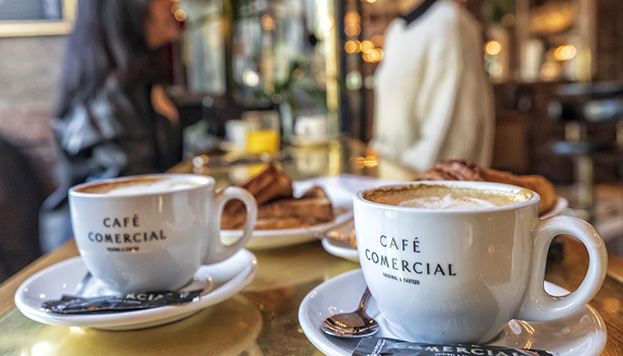
© Álvaro López del Cerro
On many occasions the revolving door at Café Comercial – which first opened on 21 March 1887 – welcomed Antonio Machado, who had a table reserved exclusively for him. The poet was one of the café’s regulars, as were Edgar Neville, Enrique Jardiel Poncela, Blas de Otero, Gabriel Celaya, and Gloria Fuertes. It was renowned not only for its philosophical debates, but also for its chess club, which was founded in a corner of the establishment’s first floor next to the pool table bought by owner Arturo Contreras Sepúlveda, who acquired Café Comercial in 1909.
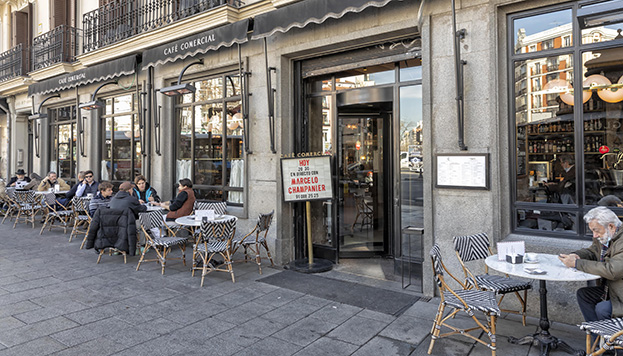
© Álvaro López del Cerro
The establishment’s first owner was Antonio Gómez Fernández, who gave it its name and installed the intricately decorated wooden artesonado ceiling. Even in its early days it was an elegant location, and the perfect place to host bandurria, piano, violin and cello concerts. To this day music is still as important at Café Comercial, which has seen a second lease of life after closing in 2015 and reopening two years later. It now boasts a lively terrace area next to the local newsstand, which has served its customers since 1984. The coffeehouse still retains many of its original decorative pieces, in addition to some newer ones that are here to stay. Among which, the inspiring quote: “para ser hay que estar” (“to be one has to learn the art of being”).
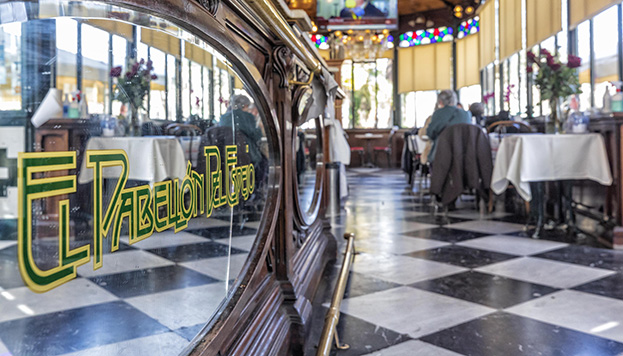
© Álvaro López del Cerro
This well-known coffeehouse, a stone’s throw away from Café Gijón, is not as old as it may seem. It first opened its doors in 1978 with décor that evokes Parisian cafés of the early 19th century, perhaps to compensate for Madrid never having had its own authentic Art Nouveau bar. Its striking pavilion, with stunning floor-to-ceiling windows and glass chandeliers, is both elegant and charming, as is its terrace garden, which is the ideal sport for breakfast or afternoon tea overlooking the Spanish National Library.
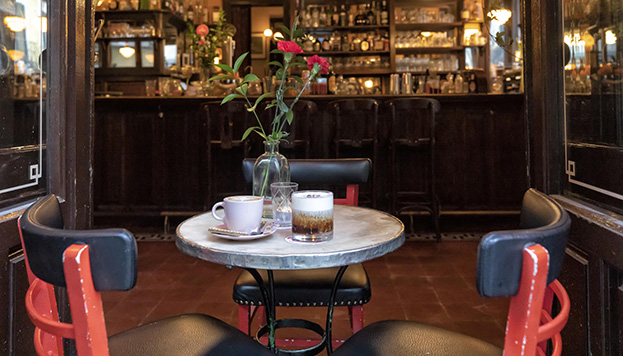
© Álvaro López del Cerro
Back in the 70s, long before vintage and retro décor made their comeback, the neighbourhood of Malasaña saw a new style of coffee shops emerge. Their design was reminiscent of the 19th century cafés which had breathed new life into Madrid’s social scene by holding philosophical debates. At their heart was a passion for culture and the mission to provide a space for customers to chat and converse over a cup of coffee. Many of these coffeehouses were decked out in wooden panelling, just like this one founded by a group of friends next to the Plaza del Dos de Mayo. Today, under new ownership, it still retains relics of its beginnings, including its original mirrors and round tables. Their specialties include the White Russian, a cocktail made with coffee liqueur.
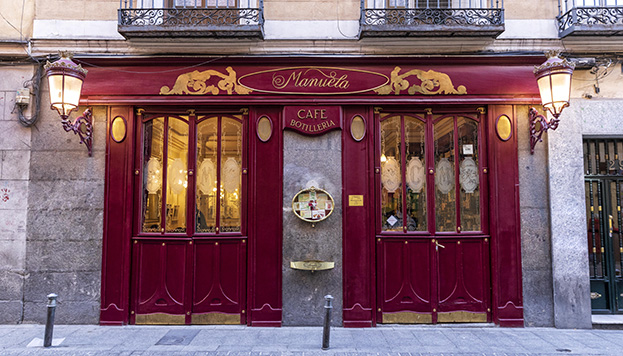
© Álvaro López del Cerro
Since 1979, this coffee shop in the heart of Malasaña has been an advocate for cultural awareness in the capital. Through its doors have passed the likes of Pedro Almodóvar, Javier Krahe, Carmen Martín Gaite, Manuel Piña, and Chicho Sánchez Ferlosio, some on more than one occasion, when Madrid’s Movida movement was in full swing. Conversations would go on until the early hours, just like they would in the very coffee shops from times gone by that Café Manuela and its décor evoke. Founded by Juan Mantrana Goyanes and known by everyone as La Manuela, this coffee shop was an advocate for social events and hosted many a concert, poetry reading and exhibition. Today Jesús Guerrero is at its helm, striving to maintain its original essence. You can’t miss its red façade.
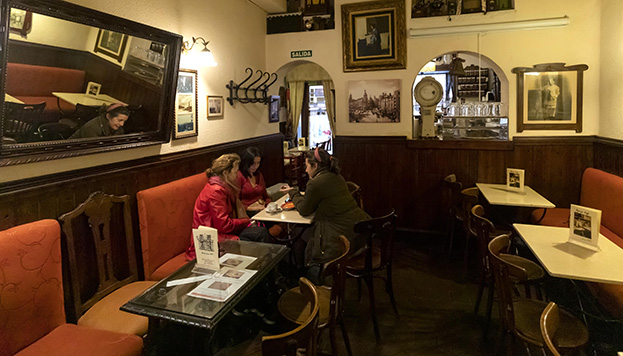
© Álvaro López del Cerro
In the words of those who manage this local coffee shop in the neighbourhood of Malasaña: “Café Ajenjo is like stepping back in time to those days when children would roll hoops in the streets and no one had a telephone or a TV at home.” Despite being established in 1978, this time machine will take you straight back to the 19th century. Low marble tables, its wood-panelled bar counter and walls, an old-style cash register, old photographs, and dim lighting add the finishing touches to this quiet spot.
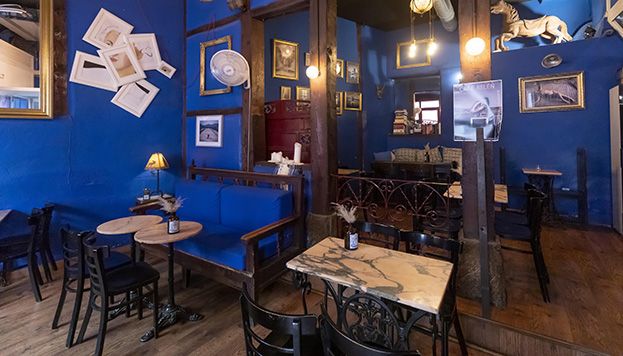
© Álvaro López del Cerro
Café Belén opened its doors in 1983, and since then has become a favourite spot among the residents of Madrid’s Chueca neighbourhood. The café closed in 2014, but a group of friends came to its rescue and reopened it after minimal renovation work. You’ll still find its original hydraulic tiled floor, but the walls are now blue. Open since April 2015, it still serves its famous cocktails, organic teas and great coffee. A coffee shop with a warm and welcoming atmosphere, which often hosts exhibitions.